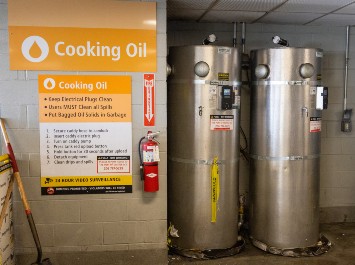
SEA supports tenants with recycling and waste disposal compliance
SEA's Environment and Sustainability Department offers tenants a variety of resources to reduce waste and ensure proper waste disposal. Review SEA's Food Service Ware and Recycling Requirements, utilize our sorting guidance, and request free bins and educational materials by exploring the page below.
For questions, contact SEA's Environment and Sustainability Department at recycle@portseattle.org or (206) 787-5525.
Food Service Ware and Recycling Requirements
All airport tenants must comply with SEA's recycling requirements as outlined in the Rules and Regulations and their lease agreements.
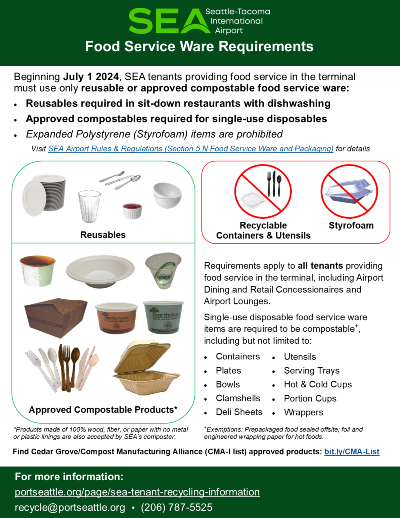
*NEW* Effective July 1st, 2024, SEA tenants providing food service must use only reusable or compostable food service ware:
- Reusable food service ware shall be used at businesses with sit-down dining and dishwashing capacity.
- Compostable single-use food service ware is required where reusable products are not practical and must:
- Be Compost Manufacturing Alliance certified under CMA-I category
- Comply with Washington state Plastic Product Degradability requirements in RCW Chapter 70A.455
- "Styrofoam" or expanded polystyrene (EPS) foam is prohibited
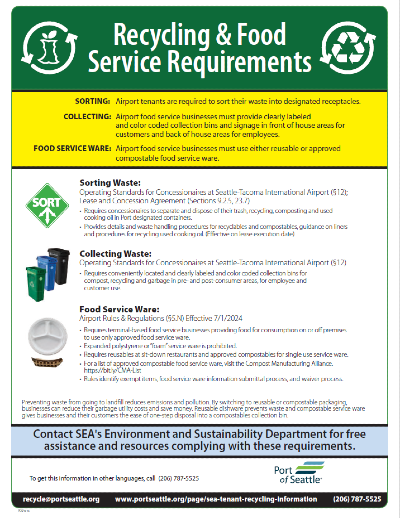
What SEA tenants need to do:
- Use approved (reusable or compostable) food service ware
- Properly sort waste into designated bins
- Collect waste in clearly labeled bins
For more details, visit Section 5 of the Seattle-Tacoma International Airport Schedule of Rules and Regulations.
Learn How to Properly Sort Waste
Recycle Right! It Matters!
Recyclables need to be empty, clean, and dry. Food and liquids contaminate other recyclables in the bin. Help SEA sort correctly so more materials can turn into new products!
Learn more about recycling right from the Washington State Department of Ecology.

Recyclable Materials:
| Paper | Plastic | Metal | Glass |
|---|---|---|---|
|
|
|
|
Find a comprehensive list of recyclables at Recology.
Compost More! Waste Less!
Tenants can compost food scraps, used napkins, pizza boxes, and approved compostable food service ware packaging. Food + Compostables go to a local composting facility and come back to SEA as soil amendments used in landscaping.

Compostable Materials:
| Food | Food-Soiled Paper | Approved Compostable Packaging |
|---|---|---|
|
|
Find a comprehensive list of compostables at Cedar Grove.
When In Doubt, Find Out!
Unsure of how to dispose of a certain material? Use SEA's guidance or Seattle Public Utilities Where Does it Go? Tool*
*This link is intended for general information only. Not all guidance matches SEA's waste disposal requirements. For questions, contact SEA's Environment and Sustainability Department at recycle@portseattle.org.
Any material that cannot be recycled or composted should be disposed of in the trash. Examples include dirty foil, plastic wrap, food wrappers, foam containers, gloves, masks, plastic cutlery, and straws.
Other Recyclable Materials
SEA offers on-site recycling for used cooking oil, metal, and wood at various locations.
- Used cooking oil: Place waste cooking oil in the collection tanks at the Concourse A / IAF Load Dock, South Satellite, Central Terminal South, Service Tunnel Load Dock, Central Terminal North, North Satellite, and D11. Learn how to dispose of cooking oil properly with this tutorial.
- Metal: Place steel, rebar, aluminum, wire, and other metal items in dedicated containers at the Concourse A / IAF Load Dock, Service Tunnel Load Dock, Air Cargo 1 (west side of Building 156A), and north side of Building 161G.
- Wood: Place pallets and untreated or non-painted lumber in dedicated containers at Air Cargo 1 (west side of Building 156A).
Tenants are responsible for disposing of all other recyclable materials at an off-site facility
Use King County's What do I do with...? tool to locate businesses that accept other recyclable materials.
- Large bulky items: For management of large or bulky items, contact SEA's Environment and Sustainability Department at (206) 787-5525.
- Appliances: Appliances can be taken to the Bow Lake Transfer Station.
- Please consider donating working appliances to local community organizations.
- Electronics: For information on recycling computers, laptops, televisions, etc., visit E-Cycle Washington.
- Light bulbs and tubes: For information on recycling fluorescent light fixtures, visit LightRecycle Washington.
- Chemicals: For information on disposing of chemicals like paint and cleaners, visit King County's Hazardous Waste Management Program or call (206) 787-5525.
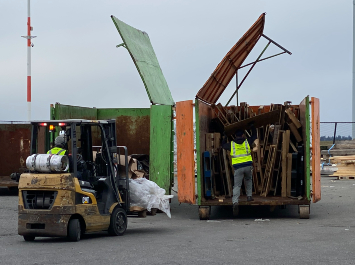 Air Cargo Spring Spruce-Up
Air Cargo Spring Spruce-Up
Cargo tenants! Participate in Air Cargo Operations and Development's Spring Spruce-Up, held annually in April. Clean up your cargo area by recycling or disposing of unwanted trash, wood, scrap metal, appliances, and electronics in provided dumpsters. Hazardous materials are not accepted.
For questions about this program, email [email protected].
SEA Recycling and Waste Disposal Locations
Explore the most frequently used recycling and waste disposal areas through SEA's Waste Disposal Map and tables:
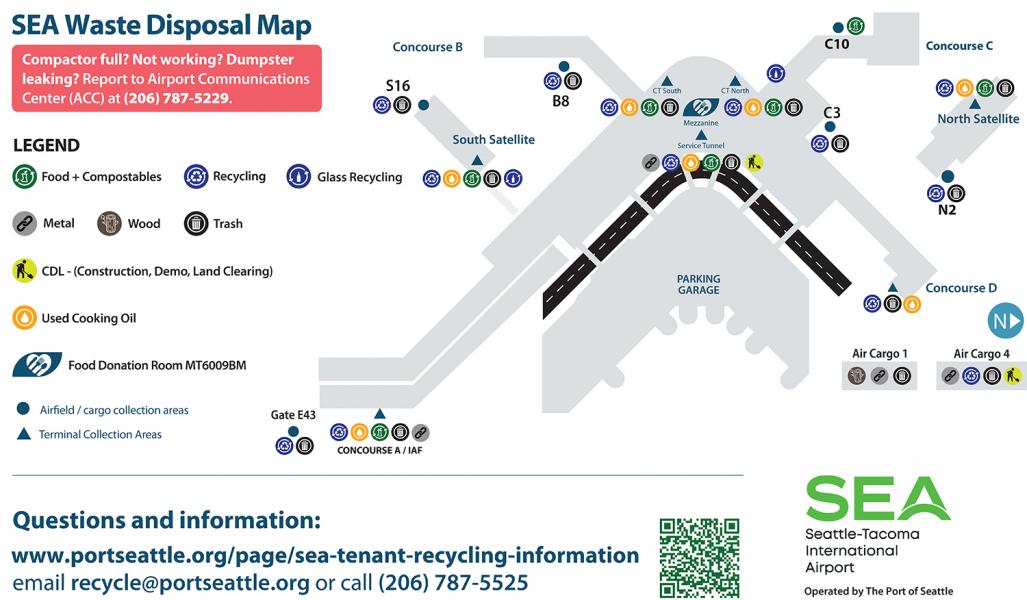
Terminal
| Trash: | Recycling: | Food + Compostables: | CDL (Construction, Demo, Land Clearing): |
|---|---|---|---|
|
|
|
|
Airfield / Cargo
| Trash: | Recycling: | Food + Compostables: | CDL (Construction, Demo, Land Clearing): |
|---|---|---|---|
|
|
|
|
Glass accepted at all recycling locations. The South Satellite and Central Terminal North areas have separate containers dedicated to glass.
Compactor Keys
To operate the recycling and trash compactors, tenants must use a compactor key provided upon request by SEA's Utilities Services. Keys are programmed for each company to ensure accurate billing. Access the compactor key request form, training, and additional information, on the Solid Waste Utility Services page.
Compactor full? Not working? Dumpster leaking? Report it to Airport Communications Center (ACC) at (206) 787-5229.
Food Donation Program
Operating in partnership with the Des Moines Area Food Bank, SEA's Food Donation Program keeps high-quality perishable and prepared food from going to waste while helping to feed local community members. SEA encourages all airport concessionaires and tenants who generate food to participate.
Contribute to our community impact: Since the beginning of the program in 2006, SEA participants have donated over half a million pounds of food. Every week, participants donate an average of more than 700 meals!
Learn how to join through our participation information.
Read more about the program on the Port's blog.
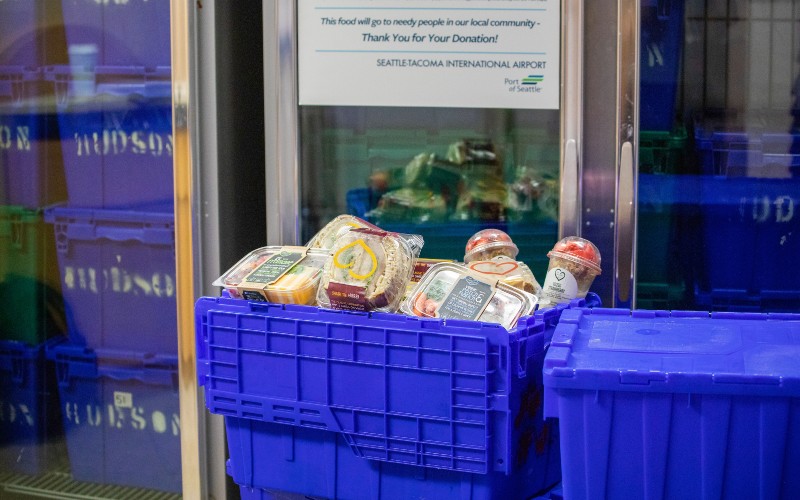
Free educational materials and training for tenants
Recycling educational materials and on-site training are free and available to all airport employees and tenants. Request these resources by emailing SEA's Environment and Sustainability Department at recycle@portseattle.org.
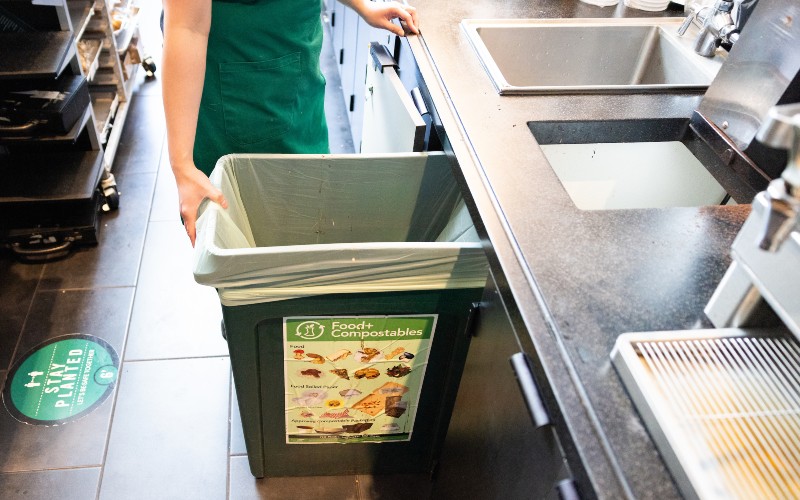
Posters

Labels and decals

Multilingual Sorting Guidance
SEA's sorting guidance is available in these languages:
Email [email protected] for printed versions of these materials.
Collection bins
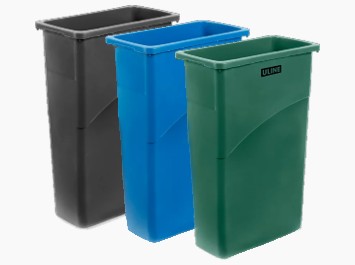
- Color Options: Black (Trash), Blue (Recycling), and Green (Food + Compostables).
- Size Options: 7, 10, or 23 gallons.
On-site training
Learn how to properly sort your waste! SEA offers free on-site training to all airport employees. To schedule, email recycle@portseattle.org.
Prevent Waste, Choose Reusable!

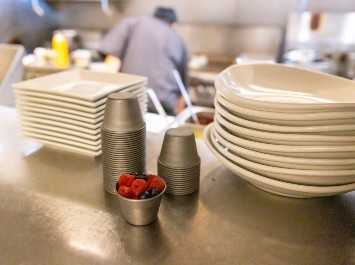 SEA encourages food service tenants to prioritize using reusable food service ware. While sometimes using single-use packaging is unavoidable, the best thing to do to protect the environment is to prevent waste in the first place. Switching to reusable food service ware also has financial advantages, including reduced purchasing and solid waste disposal costs. Enhance your customers' dining experience by choosing reusable food service ware!
SEA encourages food service tenants to prioritize using reusable food service ware. While sometimes using single-use packaging is unavoidable, the best thing to do to protect the environment is to prevent waste in the first place. Switching to reusable food service ware also has financial advantages, including reduced purchasing and solid waste disposal costs. Enhance your customers' dining experience by choosing reusable food service ware!
Check out ReThink Disposable's Reusable Food Serviceware Guide for more on the benefits of reusables.
Contractor Guidance for Construction Waste
Construction contractors must follow Port Construction Waste Management requirements (Section 01 74 19, pg. 212).
Additionally, King County requires construction contractors to comply with regulations regarding both recyclable and non-recyclable construction and demolition waste. Access King County's list of designated C&D facilities.


